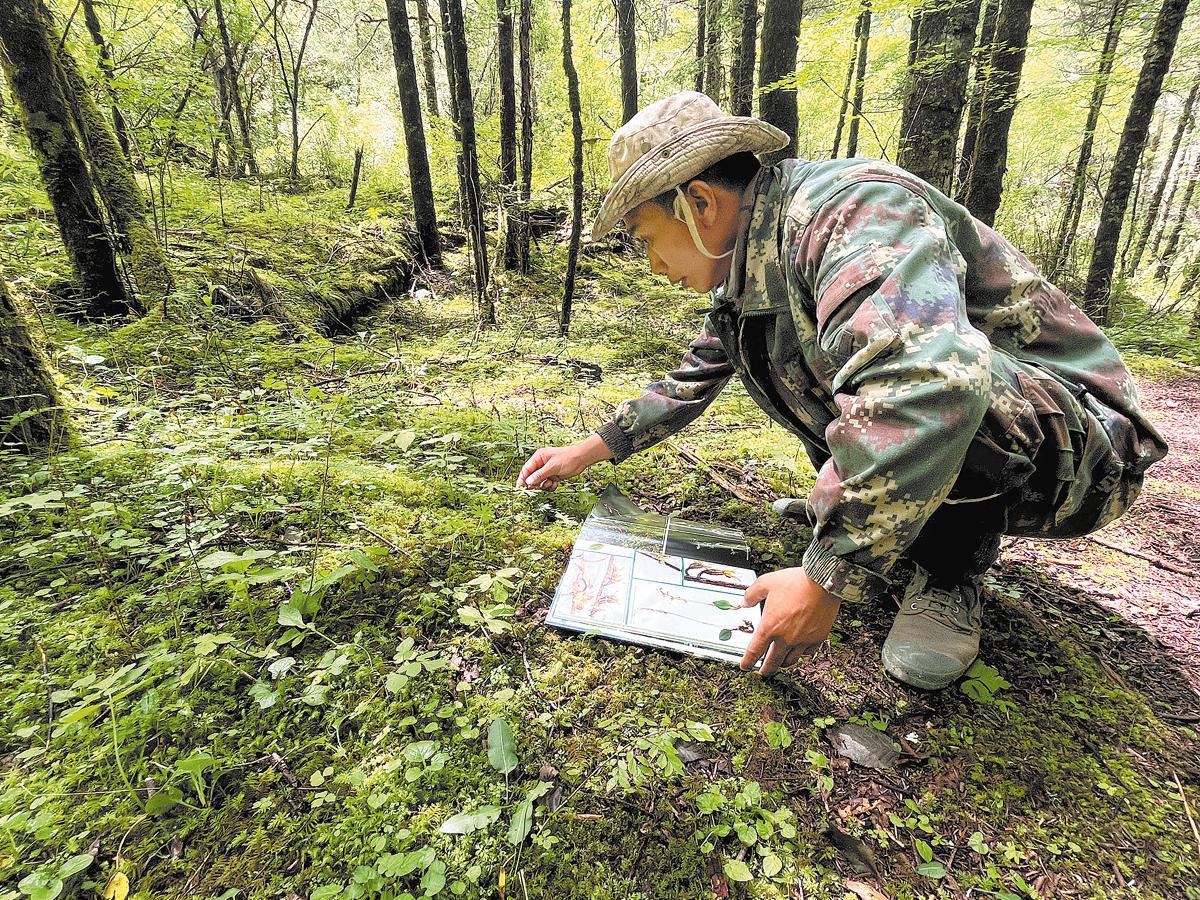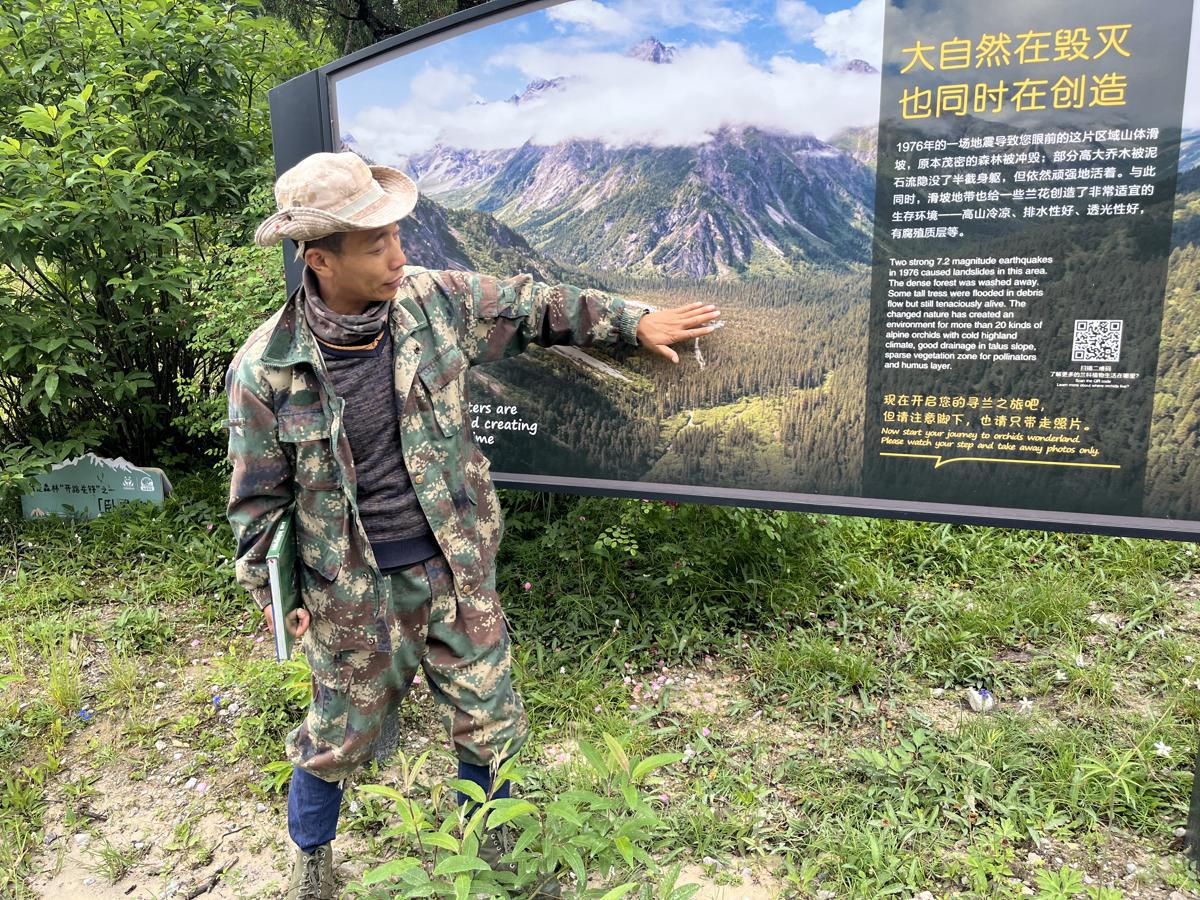Conservationist at Sichuan's Wanglang reserve passes on passion to the world


Visitors planning a trip to the Wanglang National Nature Reserve in Pingwu county, Sichuan province, have a great opportunity to gather information about the destination via mobile applications like WeChat. Once the app recognizes your interest in Wanglang, its algorithm will automatically suggest articles about the area.
Before setting foot in the reserve, those interested in the pristine area nestled in the Minshan Mountains of northern Sichuan might find themselves reading articles titled "The Returning Beekeeper from the Panda Hometown, Li Xinrui". These articles offer a glimpse into the area's rich biodiversity, familiarizing outsiders with its diverse fauna and flora.
The author, Li Xinrui, was once a beekeeper, but is now a patrolman at Wanglang. Despite having only a middle school education, Li has developed a deep understanding of the natural world through self-study and his daily work.
His more than 400 articles on science and nature are both informative and engaging, revealing his passion and knowledge.
Inspirations from outside
At 42, the man had spent a decade wandering in different regions of the country before he finally discovered his true calling and passion.
Born in the quiet village of Guanba, about 20 kilometers from the county town of Pingwu, Li, like many young people, yearned for adventure beyond the mountains. At 18, he enlisted in the army and became a soldier in a tank division in Northwest China.
After his military service ended in 2001, he worked as a waiter, a cook and a driver. At 29, Li returned to Guanba, drawn back by the prospect of marriage and the promise of taking over his father's beekeeping business.
As he settled back into village life, Li learned about the unique significance of his home from visiting conservationists from a nonprofit organization. They told him that Pingwu is an important giant panda habitat — the 2015 national survey revealed it to be the county with the highest giant panda population in China. They spoke of Guanba's pristine environment and its abundant natural resources, gradually reshaping his vision for the future.
"Outsiders want to protect our mountains and rivers, I thought," he said. "Shouldn't we, the people who live here, do something too?"
This inspiration led him to join the village's voluntary patrol team in 2013, eventually rising to the position of leader, all while continuing to care for his bees.
He began learning how to set up infrared cameras to monitor the wildlife inhabiting the forest surrounding the village, working alongside conservationists from the NGO and rangers from the Wanglang Nature Reserve. These cameras eventually captured footage of remarkable animals such as the giant panda, black bear, Chinese goral and Asian small clawed otter.
In 2016, an author from Mianyang city in Sichuan visited Guanba to write about the village. He encouraged Li to document his experiences through writing. As a literature enthusiast, Li embraced this suggestion and launched a public account on WeChat in October 2016. Since then, he has consistently updated the account with articles, sharing his insights and experiences with a broader audience.

A new chapter
In 2020, a new chapter began when Li got the chance to join the Wanglang reserve's patrol team.
The team of 20 patrolmen, including Li, work in three groups, said Zhao Lianjun, director of the reserve. While two groups spend 20 days each month traversing the rugged terrain, members of another group will take their turn to have a 10-day break back home. "When we're working within the reserve, we're on duty 24/7 for a stretch of 20 days straight," Zhao said.
When projects call, patrolmen's days begin before dawn. Their duties are multifaceted. They monitor wildlife, patrol against poaching and illegal harvesting of traditional Chinese medicine, and safeguard against fires.
"In spring and summer, we often focus on persuading the locals to give up collecting precious caterpillar fungus in the reserve's core zone," Li said. "In winter, educating villagers about fire hazards is another crucial aspect of our work."
In Wanglang, Li said, roughly 60 percent of the patrol work directly relates to giant pandas. Whether it's replacing batteries and memory cards for infrared cameras or gathering evidence of the pandas' movements, Li and his colleagues must traverse dense bamboo forests.
"The bamboo is so thick and tough," he said. "We try not to use knives, to protect the plants and save energy. We push our way through, along the mountains and animal trails. While you push through the bamboo, it can spring back and hit the person behind like a drawn bow."
On Aug 22, 2021, Li had his first real glimpse of a giant panda in the wild.
He was driving with five colleagues when suddenly, one of his colleagues exclaimed, "Look! What's that?" About 50 meters away, a panda was descending a slope. They were overcome with excitement. Li, camera in hand, managed to capture a short video, but his hands trembled so much that the footage was shaky.
In addition to encountering a panda, he also faced peril in the wilderness. In 2020, while setting up cameras for snow leopard research in a high-altitude area, he was caught in a sudden storm. Drenched to the bone, he began shivering uncontrollably and came dangerously close to hypothermia. "Ever since that experience," he said, "I never venture into the mountains without my raincoat."
Recently, Li has been involved in a global research project focused on forest ecology and climate change. The project involves dividing a 26-hectare section of primitive forest into 630 plots. Within each plot, every tree with a diameter greater than one centimeter must be measured, marked and cataloged.
"It's not technically demanding, but it's incredibly tedious," Li said. "Everyone is working hard, with only a short break for lunch."
After becoming a ranger, Li said, his connection to the mountains in Wanglang has grown stronger every day. He hopes to inspire more people to respect, understand and protect nature.
Li uses his skills to promote conservation through social media. He has written articles and even poems, and published short videos, sharing his knowledge and passion with the world. In 2023, he was awarded the "Patrol Creation Master" award in a competition held by the province's forestry department.
"I chose to become a ranger because protecting these mountains is the right thing to do," Li said. "Just saying you 'love' them is empty. Action is what counts."
























